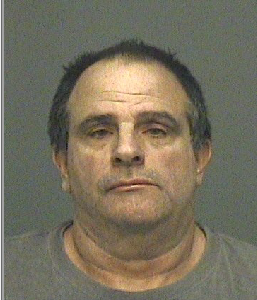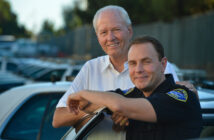Editor’s note: In honor of Behind the Badge OC’s one-year anniversary, we will be sharing the 30 most-read stories. This story from Huntington Beach PD was originally published Dec. 11.
The women don’t speak English, and they don’t go outside.
The barefoot, lingerie-wearing women live behind drawn blinds and don’t answer the door.
Their drawers are stuffed with condoms.
Scenes like this are repeated in dozens of places across Orange and Los Angeles counties in the seedy world of sex trafficking.
In Huntington Beach, an investigation headed by two detectives led to the shuttering of two brothels and the conviction of the man who ran the operation with his former prostitute wife.
The case prompted Huntington Beach to join the Orange County Human Trafficking Task Force and is used as an example of international trafficking by a special prosecution team with the Orange County District Attorney’s Office.
And it all started with a phone call from a resident complaining about “something weird going on” in their neighborhood.
BROTHEL STING
Detectives Kevin Kesler and Steven Fong posted up across from small apartments near Beach Boulevard and Talbert Avenue.

Chace, 57, was convicted of felony pandering and sentenced to a year in county jail and eight years formal probation.
A resident’s complaint on June 14, 2012 suggested drug activity, but the evidence pointed elsewhere.
Mattresses were delivered to the residence, but no other furniture.
They saw a woman driving a van deliver food and water through a back door.
The detectives’ experience told them what they already knew, but ultimately had to prove: someone was running a human trafficking ring.
“Men are coming and men are going, but it doesn’t look like drug deals,” Kesler said. “These girls stayed inside, and never came out.
“If it was straight prostitution, we would’ve seen these girls coming and going.”
Kesler and Fong tracked the address to Back Page and Craigslist advertising massages from “sexy girls.”
“We find two different ads, different pictures, two different telephone numbers and two different locations,” Kesler said. “Steve called and negotiated a price but we don’t go. It’s a test.”
They delved deeper.
A couple seemed to be running an operation involving several women out of two locations: a split-level apartment in the 17000 block of Cameron, and a two-bedroom apartment in a large complex near Brookhurst Street and Hamilton Avenue.

Chuani Wei is suspected of fleeing to China after being arrested on suspicion of running a prostitution human trafficking operation in Huntington Beach.
The advertisements led the detectives to the Garden Grove home of Chris Chace and his wife.
There detectives learned of their far-from-classic love story.
Chace first met his wife when he paid her for sex at a brothel fronting as a massage parlor, the detectives said.
He turned into a repeat customer and, somewhere along the way, the two fell in love.
Chace married the prostitute-turned-lover and they eventually started running brothels with human trafficking victims from China.
Chace’s wife allegedly became “Mamasan,” which is another word for pimp, and Chace was responsible for collecting the girls from the airport and bringing them to their brothels, the detectives said.
The detectives said it is unknown how long the pair ran the operation, but Mamasan had previous arrests for activities involving prostitution.
Fong and Kesler set up a sting operation on Oct. 3, 2012 and arrested Chace, his wife, and four suspected human trafficking victims.
What happened next was unexpected.
“From experience when you go do the search warrants and try to make arrests, nobody is going to say anything,” Fong said.
Victims of human trafficking are often manipulated to fear the police and government, making them hesitant to cooperate, Fong said.
This time was different.
Two of the women arrived from China just weeks before the sting, making them more open to speaking with police.
One victim told Fong she signed on for life as a prostitute in America because she wanted to pay for her eldest son to go to college.
“They basically turn these people into slaves through some kind of mental or economic coercion,” Fong said. “They are promised money to come to America, and told once they pay back the loan, they can go do whatever they want.
“The reality is, they are never able to pay back the loans.”
Chace, 57, was convicted of felony pandering and sentenced to a year in county jail and eight years formal probation. He is currently in custody.
His wife, Chuani Wei, fled to China in April before standing trial. She is suspected of pandering, and there is currently a $100,000 warrant out for her arrest, Kesler said.
INFLUENTIAL CASE
This was a landmark case for Huntington Beach police and Orange County law enforcement officials looking to target human trafficking in the county.
“Most people don’t realize that California is a destination for human trafficking,” said Deputy District Attorney Daniel Varon. “Orange County is a destination because this county has a lot of disposable income.”
Varon said the Huntington Beach case serves as a prominent example of the type of international human trafficking police and prosecutors are handling in Orange County.
“This case was important for us in learning how to properly prosecute brothel cases,” Varon said. “We learned what worked and what didn’t.
“It helped us and law enforcement agencies develop investigation strategies.”
The DA recently formed a special team called the HEAT unit (Human Exploitation and Trafficking), which is made up of four prosecutors – three felony attorneys and one misdemeanor attorney – to handle such cases.
The DA formed the team in April after fielding cases from the Orange County Human Trafficking Task Force.
“We started getting cases from the task force that highlighted the importance of approaching prostitution from a victim-centered standpoint,” Varon said.
The Orange County Human Trafficking Task Force was formed in 2004 by the Westminster Police Department, other law enforcement agencies and advocacy groups, including the FBI and the Sisters of St. Joseph Orange.
In 2010, Anaheim police Sgt. Craig Friesen spearheaded an effort to change the way Orange County law enforcement approached prostitution cases.
“For years, law enforcement did little to offer victims of human trafficking an opportunity to escape the life they were in,” Friesen said. “We perpetuated the traffickers brainwashing by making arrests, issuing citations, and sending the victims right back to be victimized.
“We believed a victim-centered approach would help us build trust with the victims and empower them to prosecute their traffickers.”
Friesen said the Anaheim Police Department started the movement with the support of the Orange County Human Trafficking Task Force and Community Service Programs Inc.
“We slowly started to change lives,” he said. “We are now able to offer restorative services, shelter, and support.”
Also in 2010, Huntington Beach joined the task force, which has grown since its inception to include seven law enforcement agencies and more than 25 community partners.
Since the task force was founded in 2004, nearly 400 women from 26 countries have been helped.
Huntington Beach and Anaheim now serve as the lead law enforcement agencies on the task force, and last year made 52 human trafficking-related arrests combined.
Of those, 48 cases were prosecuted.
“Once we changed our mindset and our approach, we started finding cases all across the county,” Friesen said. “We formed collaborative partnerships with numerous law enforcement agencies throughout the county, which increased our ability to rescue victims.”
The task force now includes two full time deputies from the Orange County Sheriff’s Department, an investigator from the OCDA and an investigator from the California Highway Patrol.
“We are a true collaboration of law enforcement, victim advocates, non-governmental organizations, and the faith-based community,” Friesen said. “We have a philosophy that we ‘check our egos and logos at the door’ to do what’s best for our victims.
“That philosophy has worked, but there is still a lot of work ahead for all of us.”
 Behind the Badge
Behind the Badge



